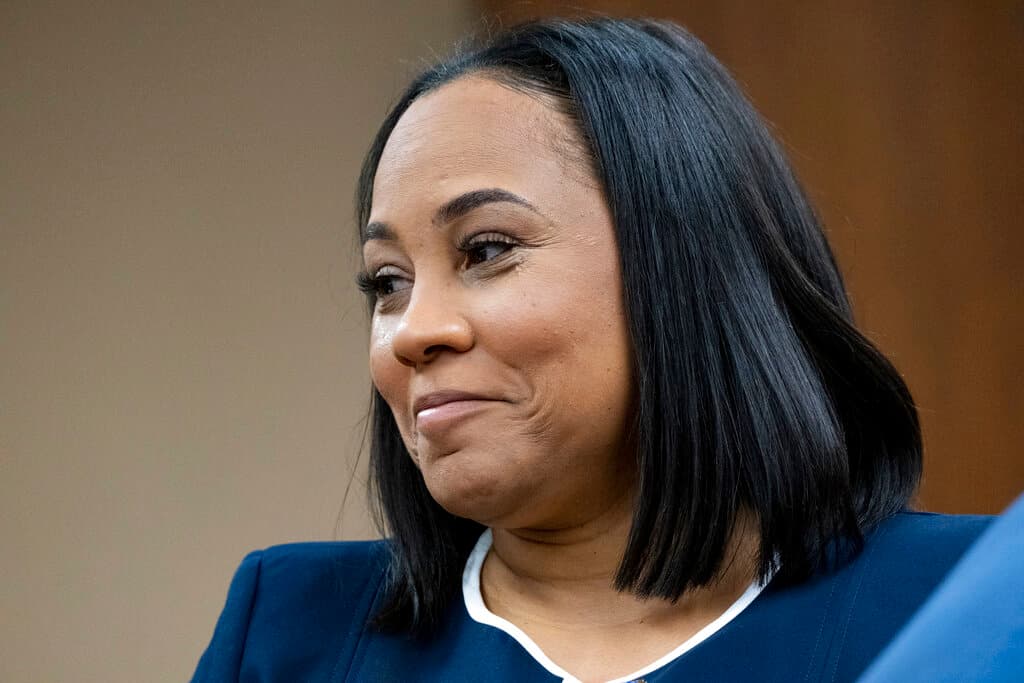Racketeering Charges Stalk Trump in Georgia
The former president is being pursued by a state prosecutor casting a wide net.

All eyes are on Georgia as legal peril for President Trump is coming into focus most clearly in the Peachtree State, where a Fulton County district attorney, Fanni Willis, appears poised to hand up charges that no presidential pardon, which covers federal crimes, could cover. With Mr. Trump’s 2024 campaign under way, she seems set to act.
While President Biden’s own classified document travails appear to complicate Attorney General Garland’s path to handing up indictments to Mr. Trump for what look to be similar paper trails, Ms. Willis has to contend with no such political overhang. Mr. Biden won 73 percent of the Fulton County vote in 2020.
That intention came into focus when Ms. Willis urged a state judge to keep a special grand jury report secret. According to Georgia law, that body cannot itself issue charges, but generates a report and recommendations. The district attorney argued before the bench that charging decisions were “imminent” and that issuing the report could impinge on “future defendants.”
In urging that the report be kept under wraps, Ms. Willis finds herself opposing the grand jury’s own recommendation that it be released. Among the 75 witnesses it heard from were Georgia’s governor, Brian Kemp, as well as Senator Graham, who appeared after a constitutional challenge rooted in the Constitution’s Speech and Debate clause was beaten back.
At the core of the case is a phone call Mr. Trump made to the Georgia secretary of state, Brad Raffensperger, on January 2, 2021, asking him to “find 11,780 votes, which is one more than we have,” referring to Mr. Trump’s margin of defeat in the state. According to the Associated Press, Ms. Willis’s probe now encompasses other efforts to affect the election, including fake electors and “misinformation.”
Ms. Willis is confident in her own case, even as she has refrained from mentioning Mr. Trump by name. She told the Washington Post that the “allegations are very serious” in relation to the 2020 election. She added that “if indicted and convicted, people are facing prison sentences.”
It appears as if Ms. Willis is focused on three state statutes in her pursuit of Mr. Trump; conspiracy to commit election fraud, criminal solicitation to commit election fraud, and intentional interference with performance of election duties. Each carries a prison sentence measured in years.
While Mr. Biden’s victory ultimately held up, the Georgia conspiracy statute, like the federal one, notes that the “crime shall be complete when the conspiracy or agreement is effected and an overt act in furtherance thereof has been committed, regardless of whether the violation of this chapter is consummated.”
There could be another path to prosecution. By her own account, Ms. Willis has found a potent prosecutorial tool in Georgia’s Racketeer Influenced and Corrupt Organizations — or RICO — Act. She brags that she has “more RICO indictments in the last 18 months, 20 months, than were probably done in the last 10 years out of this office.”
Those RICO cases, which include a 2013 prosecution of educators in Atlanta accused of inflating students’ scores on standardized tests — 11 were convicted — and recent charges against a gang named “YSL” and rappers “Yung Thug” and “Gunna,” could offer a blueprint for indicting Mr. Trump.
The statute notes that it is a “crime for any person through a pattern of racketeering activity to acquire or maintain any interest in or control of any type of property or business.” Ms. Willis’s office appears to be contemplating whether that interdiction is elastic enough to encompass Mr. Trump’s electoral efforts in her state.
Like the federal RICO statute, any prosecution requires an underlying “predicate” offense. In Mr. Trump’s case, these are likely to include fraud and obstruction of justice. RICO’s use to both state and federal prosecutors has outsripped its origins as a means of tackling organized crime.
The Department of Justice has recognized the danger in RICO’s broad applicability, and, as one summary puts it, only prosecutes “cases where the unlawful conduct was both continuous and egregious and when there is the prospect of significant forfeiture of ill-gotten proceeds or of interests in a tainted enterprise.”
Georgia has no such limitation. Ms. Willis has hired an expert in RICO law, John Floyd, to assist her office in this precinct of the law. Mr. Floyd’s website at the Bondurant, Mixson, and Elmore law firm describes him as “probably the leading authority on racketeering” in America.

